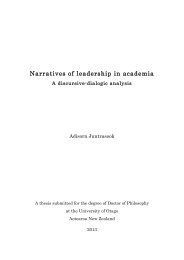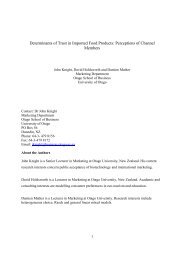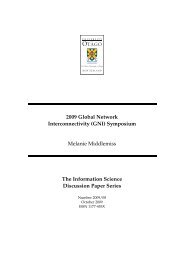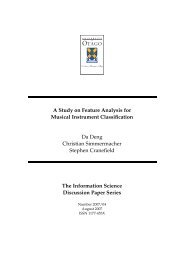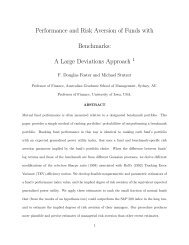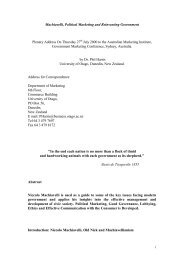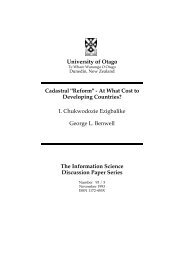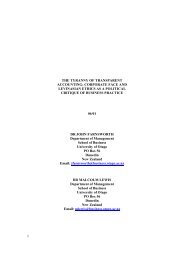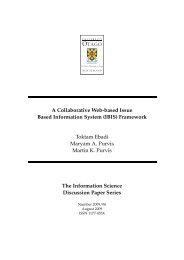Where is R2P grounded in international law? Anne-Marie Judson A ...
Where is R2P grounded in international law? Anne-Marie Judson A ...
Where is R2P grounded in international law? Anne-Marie Judson A ...
You also want an ePaper? Increase the reach of your titles
YUMPU automatically turns print PDFs into web optimized ePapers that Google loves.
duties to implement and enforce these duties through local jur<strong>is</strong>diction, education and<br />
military programmes, however it does not have a duty to build the capacity of other<br />
states. Th<strong>is</strong> duty cannot be clarified <strong>in</strong> <strong>in</strong>ternational customary <strong>law</strong>.<br />
As previously d<strong>is</strong>cussed the state <strong>is</strong> responsible for its own actions <strong>in</strong> <strong>in</strong>ternational <strong>law</strong>;<br />
these actions <strong>in</strong>clude om<strong>is</strong>sions and the om<strong>is</strong>sion to act. States are responsible only for<br />
the duties that they have assumed, duties that they have chosen to adopt, to<br />
implement, to ratify, to sign and to agree. Beyond these, the duties of the states are<br />
limited by <strong>in</strong>ternational norms and customary <strong>law</strong>s that apply to all states and are<br />
recognized by the <strong>in</strong>ternational community as custom and upheld by courts as legally<br />
b<strong>in</strong>d<strong>in</strong>g contracts. <strong>R2P</strong> re<strong>in</strong>forces and outl<strong>in</strong>es these duties but it does not add to<br />
them. It cannot be used to enforce the duties <strong>in</strong> <strong>in</strong>ternational <strong>law</strong>; it only declares<br />
them <strong>in</strong> a way that states can be rem<strong>in</strong>ded that their duty <strong>is</strong> to protect their citizens <strong>in</strong><br />
<strong>in</strong>ternational <strong>law</strong>. Beyond th<strong>is</strong> the duty to protect rema<strong>in</strong>s <strong>in</strong> the hands of the Security<br />
Council and the United Nations to ensure that the ma<strong>in</strong>tenance of <strong>in</strong>ternational peace<br />
and security <strong>is</strong> be<strong>in</strong>g enforced. Only through the Security Council can enforcement<br />
resolutions be written and only through the states can they be implemented.<br />
Therefore the duty to prevent and protect rema<strong>in</strong>s with both the state and the<br />
Security Council.<br />
FURTHER CONSIDERATIONS<br />
One question that rema<strong>in</strong>s to be answered <strong>is</strong> whether the ICCPR <strong>is</strong> an outdated<br />
Covenant that breaches the terms of the Vienna Convention on the Law of Treaties.<br />
The Vienna Convention on the Law of Treaties (1969) states that a treaty <strong>is</strong> void if it<br />
conflicts with a peremptory norm of general <strong>in</strong>ternational <strong>law</strong>. 362 If it could be proven<br />
that the ICCPR does conflict with an <strong>in</strong>ternational customary norm of <strong>in</strong>ternational<br />
<strong>law</strong> the whole Convention could be repealed and civilian rights would be restored. 363<br />
QUESTIONS ON THE LEGALITY OF BAHRAIN IN 2011<br />
The problem of Bahra<strong>in</strong> <strong>in</strong> 2011 requires further research as military mach<strong>in</strong>ery<br />
<strong>in</strong>clud<strong>in</strong>g tanks and military corps with arms were used aga<strong>in</strong>st civilians to restore the<br />
362 Article 53, Vienna convention on the <strong>law</strong> of treaties <br />
363 I have chosen to leave th<strong>is</strong> question for further research, as it deserves a lot more space than <br />
can be given <strong>in</strong> th<strong>is</strong> thes<strong>is</strong>. <br />
<br />
120



